| | | | | | Current and Former FLPC Student Highlights Students and interns published on FLPC's blog: | | | | Career Opportunities in Food Law and Policy | | | | FLPC Welcomes Food Law and Policy Clinic 2019 Summer Interns The Harvard Law School Food Law and Policy Clinic (FLPC) welcomes Jana Caracciol, Emma Dismukes, Mitchell Dowden, Lindsay Gaesser, Matthew M. Giguere, and Alicia Gilbert to the clinic! Read more about our 2019 interns. | | | | FLPC and Partner Launch the Global Food Donation Policy Atlas The Harvard Law School Food Law and Policy Clinic (FLPC) is excited to announce the launch of our latest project, the Global Food Donation Policy Atlas. The Atlas is a two-year collaborative project that will chart the laws and policies affecting food donation in 15 different countries as well as provide best practices and guidance on how laws and policies can be improved to both increase food donations and decrease food waste. To undertake this first-of-its-kind project, FLPC is partnering with the Global FoodBanking Network (GFN), with the support of the Walmart Foundation. In building the Atlas, FLPC will rely heavily on GFN’s on-the-ground food-bank partners, as well as other key stakeholders in the 15 countries, such as food-rescue organizations and other non-profits, food donors, government agencies, and academics. In addition to providing written legal guides to food donation and policy considerations for each country, the Atlas will outline its findings with a website and interactive map presenting countries’ food donation laws. Both FLPC and GFN identified 15 countries where the Atlas could be especially useful. In the first year, the Atlas will focus on Argentina, Canada, Chile, Mexico, and the United States. The second year will bring in ten more countries. | | 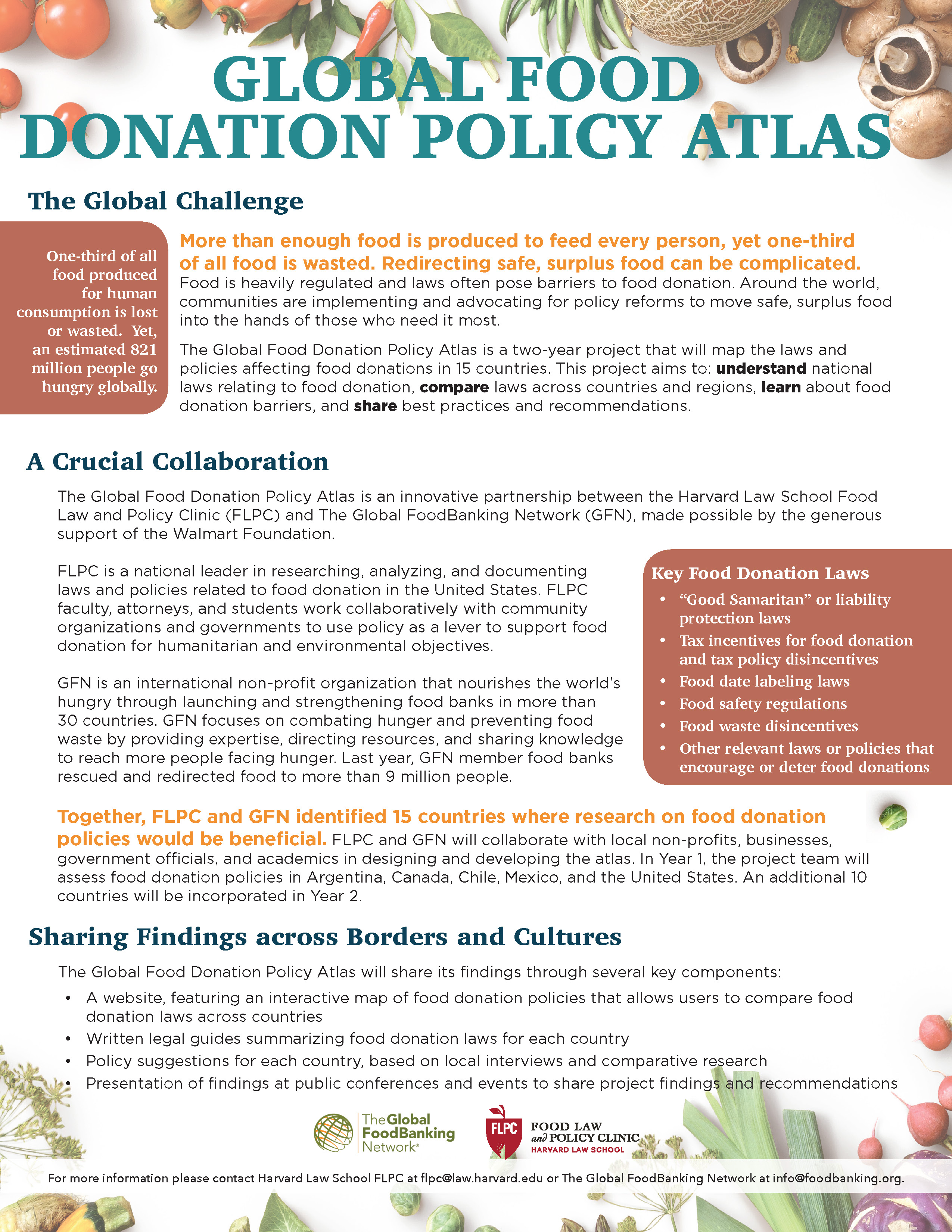 | | | | | Cows, Corn, and Crap (Video Recording)
The food system—from fertilizer manufacturing to production and distribution to food waste in landfills—is responsible for 25 – 30% of anthropogenic greenhouse gas (GHG) emissions. Agriculture is also uniquely threatened by climate change. As a result, there is growing consensus that the food system—what we eat and how we grow it—requires major change in order to protect our health, farmworkers, environment and the climate. Peter Lehner of Earthjustice came to HLS to discuss how agricultural policies and practices can make the sector carbon-neutral, while also making rural communities more livable, equitable, and sustainable. The Green New Deal and the Future of Food (Video Recording)
This panel, hosted by FLPC and many other cosponsors, brought together three leading food system advocates to examine the Green New Deal and the future of food. They proposed ways to strengthen the current plan, while also exploring its potential to create a new coalition in rural America focused on the fight for economic, environmental, and racial justice. Panelists: - Peter Lehner, Managing Attorney and Director, Sustainable Food & Farming, Earthjustice
- LaDonna Redmond, Food Justice Activist, Equity & Community Engagement Manager, Seward Community Co-op
- Connor Stedman, Ecological Designer, Farm Business Planner, and Climate Educator, Terra Genesis International
- Moderated by Nate Rosenberg, Visiting Scholar, Harvard Law School Food Law and Policy Clinic
| | | | 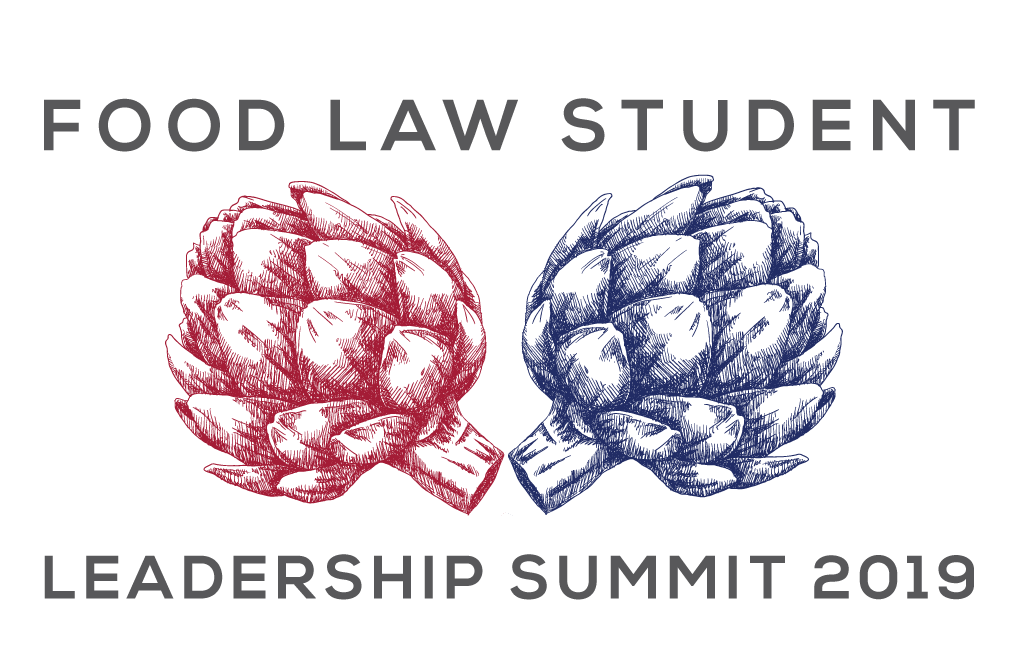 | The fourth Food Law Student Leadership Summit was held on April 5-7 in Washington, D.C. at Georgetown Law Center. Co-hosted by FLPC, the Georgetown University Global Health Justice Alliance, the Harrison Institute for Public Law, the O’Neill Institute for National and Global Health Law, and the National Food Law Student Network, the 2019 Summit was a great success thanks to its speakers, keynote, faculty, and attendees. FLPC thanks our generous summit sponsors, including the Charles M. Haar Food and Health Fund, the Food and Drug Law Institute, Hogan Lovells, and the Animal Welfare Institute. Read a blog post from a Summit attendee
View tweets from the Summit
Look at the Summit program book
Read the Summit Kudos Board | | | | | | | Recent News
Revolutionizing the Food Systems in Israel and U.S.
FLPC Director Emily Broad Leib speaks with Israeli daily news website Ynetnews on the differences (and similarities) between both country's food systems. Americans Are Still Eating a Lot of Processed Meats, Study Finds
NBC News wonders if processed meats should come with warning labels to shine a light on the dangers of consuming copious amounts of these types of foods. This Man Ate ‘Expired’ Food for a Year. Here’s Why Expiration Dates are Practically Meaningless
The Washington Post interviewed Emily Broad Leib and Mom’s Organic Market founder and chief executive Scott Nash on expiration date labels. The Best Way to Tell When Food Goes Bad isn’t By Looking at its Label
Quartz looks at the history and usefulness of expiration date labels in determining food safety. A Helpful Move on Food Date Labels
FLPC's Emily Broad Leib and Katie Sandson, Jackie Suggitt at ReFED, and JoAnne Berkenkamp at NRDC came together for this blog post on federal legislation of date labels. Harvard University Implements New Food Standards to Promote Sustainability and Health
Harvard University has adopted a set of Sustainable Healthful Food Standards. The Standards were led by the Office for Sustainability, with input from a multi-disciplinary faculty committee (including FLPC Director Emily Broad Leib), the Council of Student Sustainability Leaders, and experts in the field. Why the FDA is Considering a ‘Healthy’ Icon for Food Packaging
Pacific Standard reviews the FDA's new proposal for an agency-approved icon signifying that a food item is indeed “healthy.” Boston City Council Passes Good Food Purchasing Program
Last month, the Boston City Council unanimously voted to adopt the Good Food Purchasing Program, which requires the city to meet certain requirements for nutrition, sustainability, animal welfare, and labor, when making food purchases. The program also includes provisions to increase transparency in the food purchasing process, which were based on language created by FLPC. FLPC Welcomes Visiting Scholar Cameron Faustman
Professor Cameron Faustman who spent his 30-year academic career in the College of Agriculture, Health and Natural Resources, University of Connecticut (UConn), visited FLPC during spring 2019. 2018 Farm Bill Includes Major Food Waste Reduction Provisions, Including Several FLPC Recommendations
The House and Senate passed the 2018 Farm Bill, the first ever to include funding and programs to address the harmful social, environmental, and economic impacts of wasted food! Survey Shows That Misunderstanding Food Date Labels Linked With Higher Food Discards
A new survey from Johns Hopkins Center for a Livable Future and FLPC examines U.S. consumer attitudes and behaviors related to food date labels found widespread confusion, leading to unnecessary discards, increased waste and food safety risks. | | | | | | 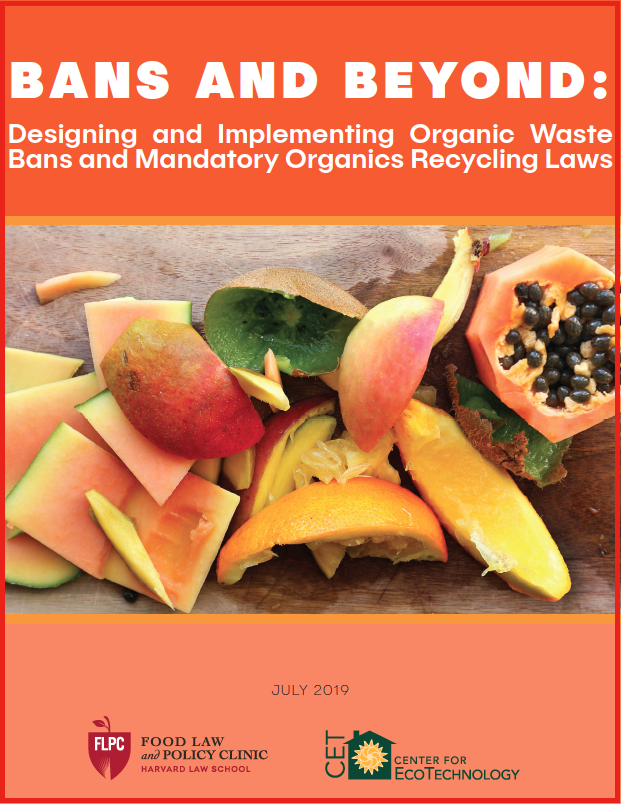 | Bans and Beyond: Designing and Implementing Organic Waste Bans and Mandatory Organics Recycling Laws FLPC and the Center for EcoTechnology have released a new toolkit on state and local organic waste bans, policies that restrict the amount of food or organic waste that can be sent to landfills. Bans and Beyond: Designing and Implementing Organic Waste Bans and Mandatory Organics Recycling Laws serves as a resource for state and local policymakers, regulators, and advocates interested in policy solutions to reduce food waste and keep food out of landfills, and examines the legal landscape of existing state and local organic waste bans. The toolkit analyzes the structure of different policies and the challenges that jurisdictions have faced in implementing them—for example, challenges with accessing funding, developing effective enforcement mechanisms, and building sufficient organics recycling infrastructure. Bans and Beyond builds on other resources FLPC has produced to support states and localities in addressing food waste through policy. | | Attend the Bans and Beyond Webinar
FLPC is excited to release Bans and Beyond: Designing and Implementing Organic Waste Bans and Mandatory Organic Recycling Laws. This toolkit is a resource for state and local policymakers, regulators, and advocates interested in policy solutions to reduce food waste and keep food out of landfills. Want to learn more? Join us for a webinar on July 30 at 3:00PM ET. Register for the webinar! | | | | 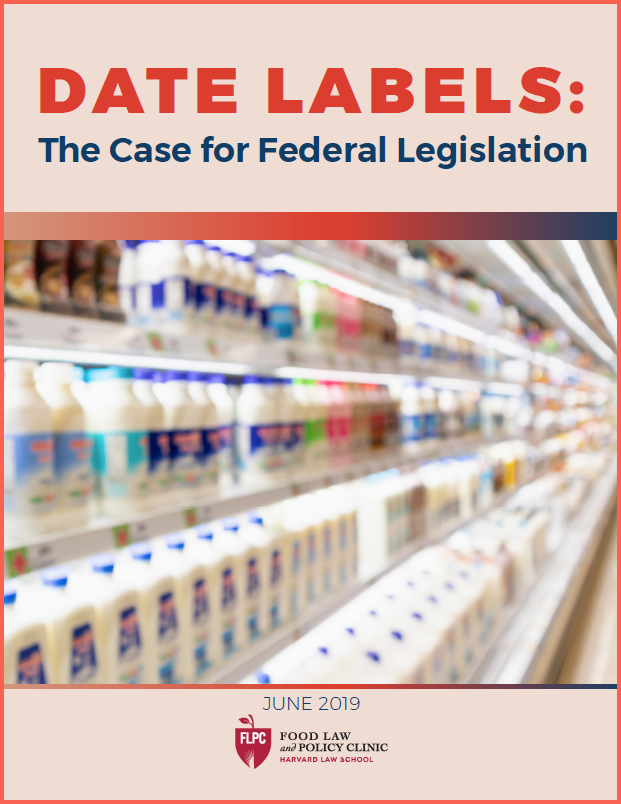 | Date Labels: The Case for Federal Action FLPC's latest issue brief outlines the need for federal legislation to standardize date labels on food products. Date Labels: The Case for Federal Action describes existing government and industry efforts to standardize date labels and presents the case for why federal action is needed. This issue brief demonstrates that federal legislation is necessary to achieve true standardization of date labels nationally. Federal legislation should require that manufacturers or retailers who choose to use date labels on foods use one of two prescribed labeling phrases: “BEST If Used By” to indicate quality, and “USE By” to indicate safety. These terms are consistent with the industry's voluntary Product Code Dating Initiative. Federal legislation should also preempt state laws that ban the sale or donation of food past the quality date, and create a national consumer education campaign to inform the public about the meaning of these labeling terms. | | 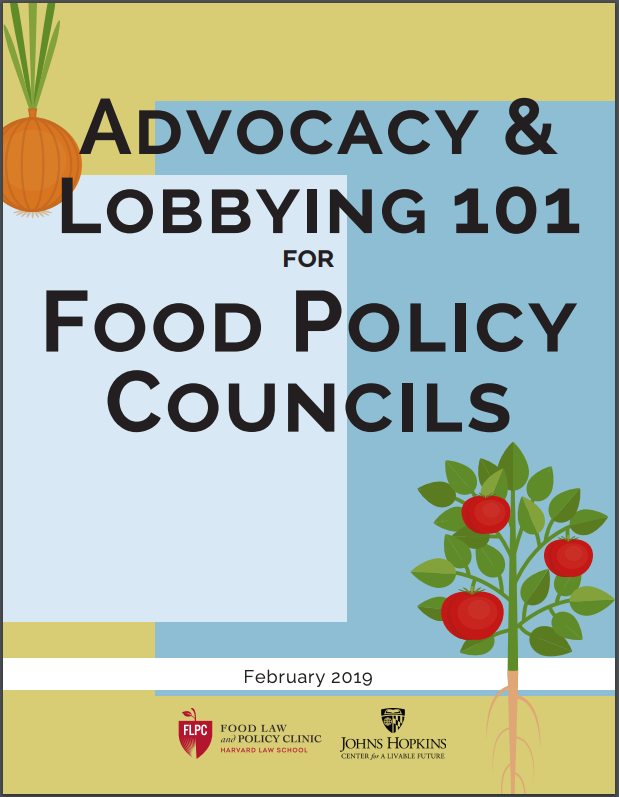 | Advocacy and Lobbying 101 for Food Policy Councils FLPC, in collaboration with the Johns Hopkins Center for a Livable Future (CLF) released a new resource for food policy councils and others working to change the food system. Advocacy & Lobbying 101 for Food Policy Councils explains the laws about influencing policy decisions by local, state, and federal government. The guide discusses what it means to lobby the government, explains how lobbying differs from general advocacy work, and addresses topics that every food policy council should consider before engaging in advocacy or lobbying. It also examines how the different organizational structures of councils affect what they may do to lobby and provides case studies to illustrate how councils have successfully and legally influenced government policy. | | | | | | | | The Harvard Law School Food Law and Policy Clinic (FLPC) serves partner organizations and communities by providing guidance on cutting-edge food system issues, while engaging law students in the practice of food law and policy with a focus on increasing access to healthy foods, supporting sustainable production and regional food systems, and reducing waste of healthy, wholesome food. Learn more about FLPC. | | | | | | | |